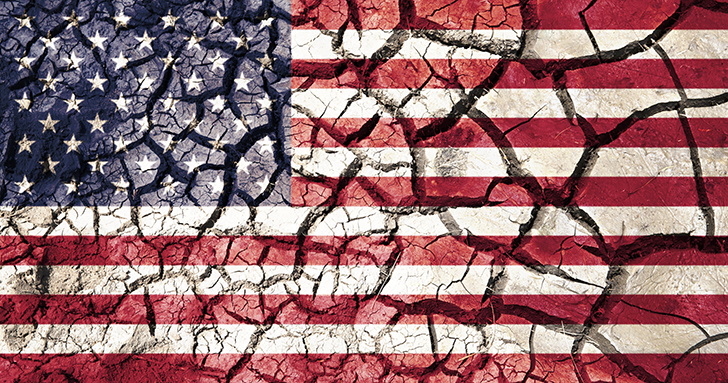Rejecting US Christianity in Hopes of Saving the Soul of the Nation
Christianity did not perish with the election of Donald Trump; it was stillborn upon first arriving to these shores. America was originally made great when Christian Pilgrims embraced their divine right to steal the winter provisions of indigenous people, thanking God for his merciful bounty. Only by stealing the land of others—justifying genocide as fulfilling God’s call to rid the Promised Land of modern-day Canaanites—could America ever have become great. Only by stealing the labor of others by capturing Black bodies—justifying slavery as God’s call to bring civilization and Christianity to lost primitive peoples whose only hope is to be servants to whites in this world and the next—could America ever have become great. Only by stealing the sovereignty of others—justifying a Manifest Destiny as God’s call to physically invade another nation to steal their land, their resources, and their cheap labor by economically expanding through Gunboat Diplomacy—could America ever have become great.
The election of Trump is not an aberration for he represents the fullest manifestation of the white Christianity feared by those relegated to the underside of US history. Trump is the prophetic fulfillment of an exceptionalism which is but the latest manifestation of white Christian supremacy that ensures the vast majority of the world’s resources flow to support six percent of the global population. And for America to ever become great again, it must return to an age of unabashed missionary zeal of white supremacy, preferring future Americans to come from nations like Norway (which is 83% ethnic white) as opposed to “shithole” countries like Haiti, El Salvador, and all of Africa.
The so-called intellectual elite and coastal-based pundits may claim they misread the forgotten Americans of fly-over red states; but the reality is those who for centuries have been relegated to their underside and margins were not surprised nor shocked by the 2016 election results. No misreading occurred for them. Trump is the natural next stage of the prevalent white Christianity practiced within the United States. This is neither the first time, nor will it be the last time, white US Christianity supported and elected white supremacist slavers (Washington), rapists (Jefferson), Indian killers (Jackson), addicts (A. Johnson), avowed racists (Wilson), petty criminals (Nixon), and sexual predators (Clinton). The election of Trump, a sexual predator, an adulterer, a liar, a swindler, and a racist by Christian America is more the norm than the exception.
When we gathered to published the book Faith and Resistance in the Age of Trump (Orbis, 2017), finishing our individual chapters barely a month after the inauguration, we feared that by the time the book was published six months later, our concerns with the incoming administration might appear overblown. The publication of the book and the warm reception it received revealed our concerns were totally unfounded. Trump policies and initiatives only got worse since those first early days which, from the start, were already death-dealing to marginalized communities—specifically communities of color. And while we seek strategies of resistance, we are cognizant of the deafening silence emanating from US Christians. But why should we be surprised? White Christians are, and have always been, the greatest existential threat to disenfranchised communities. US Christianity ceased being a religious faith tradition rooted in the teachings of Christ focusing on a justice which seeks the betterment of humanity when it made a Faustian bargain for the sake of political power and influence. Rather than being a Christ-centered faith perspective, US Christianity has become a political movement whose beliefs repudiate all Jesus advocated. Since the foundation of the republic, white Christianity has reigned supreme justifying invasion, genocide, and enslavement with an all-inclusive say in US politics.
However, for much of the past thirty-five years, those benefiting from social structures which protected white supremacy began to see their power eroded. Same gender-loving marriage; white births representing less than fifty percent in demographics; affirmative action; scrutiny and accountability of police officers who once participated in the unchallenged norm of killing unarmed people of color; and the election of a Black president provided a challenge and threat to those who assumed white privilege as a birthright. By 2016, the United States became a different, scarier world for those accustom to their power as they attempted to adjust to a more pluralistic environment where white privilege was being questioned and chipped away. To make America great again was more than an election slogan for those who pine for a time where I would have been relegated to mopping the floors of my graduate school’s classrooms instead of teaching in them. Trump represented the last great white hope to reestablish the oppressive tendencies responsible for making America great in the first place. But alas, those who look for saviors among politicians only find anti-Christs. The US white Jesus in which Donald Trump and his apologists believe can never save the marginalized, those relegated to the underside of white spaces. To say no to oppression and its symbol (even when that symbol comes disguised as Jesus), is the crucial first step toward saying yes to the self, yes to liberation, and yes to God. For the sake of our very salvation, we who belong to communities of color must say no to this white US Jesus, especially since he first said no to us.
When an owner of Black bodies, who reserved for himself the legal right to rape those who were female, wrote the immortal words: “We hold these truths to be self-evident: that all men are created equal; that they are endowed by their Creator with certain unalienable rights; that among these are life, liberty, and the pursuit of happiness,” he never meant to include his slaves. And when these words first appeared in print, no one who read them thought Blacks or Indians had unalienable rights. Life, liberty, and the pursuit of happiness was exclusively for white Christians. Since the foundation of the Republic, whites always understood all rhetoric concerning freedom and equality were never meant for Indians, for Blacks, for Latinxs, for Asians, for non-Christians. The American Dream was never intended to be for everybody. For this American Dream to exist for the few, it was always understood that the many had to live the American Nightmare of genocide, land theft, slavery, wage exploitation, and invasion.
The current Trump administration has made it abundantly clear, even for those with colonized minds still attempting to assimilate, that US rhetoric of “liberty and justice for all” excluded many of us from the “all.” The “all” of Euroamerican philosophical and religious thought only and always meant whites, definitely not the invaded, enslaved, and genocided; definitely not the colonized who followed their stolen raw material and cheap labor to the center of empires only to find walls being built that separate them from their goods. White Christianity and abstract Eurocentric philosophical thought were required to reconcile the quest for liberty and justice for whites with the purposeful exclusion of those who fell short of the white ideal. The issue is not so much hypocrisy on the part of white Christians who historically spewed rhetoric about liberty and justice; but rather, how their worldview was philosophically and spiritually constructed to justify oppression while employing freedom-based language. The move to abstract thought and a faith devoid of social justice serves a crucial purpose of obscuring the violence of dispossessing and disenfranchising the colonized and their descendants.
Even though all Eurocentric US philosophical thought and religious movements are detrimental to communities of color (yes—all), all too often the oppressed embrace the very social structures which are death-dealing. The guardians of white privilege normalized and legitimized a way of thinking and being which enslaves minds inasmuch as frees bodies; for if the mind can be colonized, then those whom society is constructed to benefit need not worry about resistance to oppression. Once those privileged by society determine what the colonized think by providing a particular white obsessed Christianity repackaged as universal, they need not be anxious about what those on their margins would do. The tragedy of faith is when Brown and Black bodies bend knees to the white Jesus of US Christianity and US Empire.
No person can serve two masters for they will love one and despise the other. Any person of color who serves and loves the normative Eurocentric philosophical universalizing thought which excludes them, or the white Gods and Jesuses bent on their subservience, will despise the philosophical wisdom emanating from their own culture. For the sake of our very salvation, and the salvation of white Americans, we must hammer the last nail into the coffin of US Christianity. US Christianity must die, and let the dead bury the dead. For Christianity to maybe experience resurrection, US Christianity must first be crucified. The crucifixion of white Christianity and the empire it justifies begins with its total and complete rejection.
Over 125 years ago, Cuban revolutionary José Martí saw the danger of people relegated to the margins of empire adopting the very same Eurocentric worldview detrimental to their existential colonized spaces. He called the oppressed of the world to create a new way of thinking, a new way of being, a new way of contemplating the metaphysical based on their indigeneity. “¡Nuestro vino de plátano” he wrote, “y si es agrio, es nuestro vino!”—Let us make our wine out of bananas, and even if it turns sour, it is still our wine! Even if our jammy vine turns out sour, it would be more pleasing to our palates than opulent wines bottled in the center of empire. Why? Because it is ours, made from our indigenous ingredients. For our survival, for our sanity, for our liberation, we must all become winemakers who harvest the finest grapes from our own vineyards. And as new winemakers, not only can we find our indigenous voices by which to resist Trump; but also, whichever emperor follows him regardless as to how liberal and progressive he or she might be.
Resources
Boles, Kirsten. "Review of Faith and Resistance in the Age of Trumpedited by Miguel A. De La Torre." Reading Religion, February 27, 2018. http://readingreligion.org/books/faith-and-resistance-age-trump.
De La Torre, Miguel, ed. Faith and Resistance in the Age of Trump. Maryknoll, NY: Orbis Books, 2017.
De La Torre, Miguel. "Interview with Miguel De La Torre, editor of Faith and Resistance in the Age of Trump." Interview by Troy Mikanovich. Reading Religion, November 2017. Print. http://readingreligion.org/content/interview-miguel-de-la-torre-editor-faith-and-resistance-age-trump.
 Miguel A. De La Torre, a scholar-activist, has authored over one hundred articles and published thirty-three books (five of which won national awards). He presently serves as professor of social ethics and Latinx studies at the Iliff School of Theology in Denver. A Fulbright scholar, he has taught in Indonesia, Mexico, South Africa, and Germany. Within his guild, he served as the 2012 president of the Society of Christian Ethics. Additionally, he is the co-founder and first executive director of the Society of Race, Ethnicity, and Religion and the founding editor of the Journal of Race, Ethnicity, and Religion. Recently, he wrote the screenplay to a documentary on immigration (http://www.trailsofhopeandterrorthemovie.com/).
Miguel A. De La Torre, a scholar-activist, has authored over one hundred articles and published thirty-three books (five of which won national awards). He presently serves as professor of social ethics and Latinx studies at the Iliff School of Theology in Denver. A Fulbright scholar, he has taught in Indonesia, Mexico, South Africa, and Germany. Within his guild, he served as the 2012 president of the Society of Christian Ethics. Additionally, he is the co-founder and first executive director of the Society of Race, Ethnicity, and Religion and the founding editor of the Journal of Race, Ethnicity, and Religion. Recently, he wrote the screenplay to a documentary on immigration (http://www.trailsofhopeandterrorthemovie.com/).
Image: Lev Dolgachov / Alamy Stock Photo

